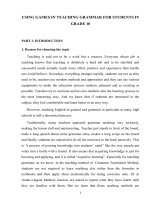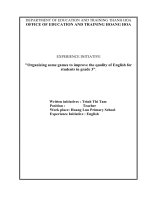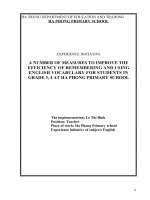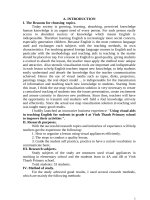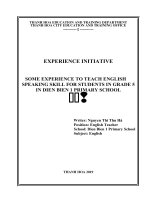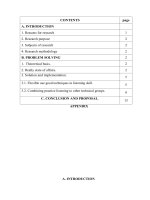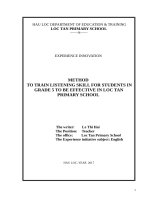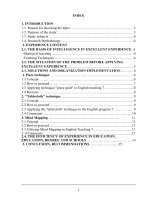Some stricks to play games for students in grade
Bạn đang xem bản rút gọn của tài liệu. Xem và tải ngay bản đầy đủ của tài liệu tại đây (489.47 KB, 21 trang )
THANH HOA EDUCATION AND TRAINING DEPARTMENT
THANH HOA EDUCATION AND TRAINING OFFICE
EXPERIENCE INITIATIVE
SOME TRICKS
TO PLAY GAMES FOR STUDENTS IN GRADE 2
The implementer: Nguyen Thi Sen
Position: Teacher
School: Dien Bien 1 Primary school
Subject: English
THANH HOA 2019
1
TABLE OF CONTENTS
1. INTRODUCTION
1.1. Reason to choose the topic
1.2. Research purposes
1.3. Research subjects
1.4. Research Methods
2. CONTENT
2.1. Rationale
2.2. Actual situation before applying experience initiatives
2.3. The solution used to solve the problem
2.4. The effectiveness of experience initiatives for educational activities,
with themselves, colleagues and schools
3. CONCLUSIONS AND RECOMMENDATIONS
3.1.Conclusions
3.2.Recommendations
Page
2
3
3
3-4
5
5-6
6-16
16
17
17
1. INTRODUCTION
1.1. Reason to choose the topic.
2
In the trend of global integration of society today, equipping yourself with a
good knowledge of foreign languages, especially English, is essential. Learning
English becomes very popular not only for working people, having to use
foreign languages to communicate in work but it is also very necessary for
elementary students who will soon be owners of the country. With the above
situation, every student must now equip themselves with a basic knowledge of
foreign languages suitable to the level of education and study.
With such a particularly important and necessary role, however, students'
language learning is not really focused and not evenly distributed among
regions, among students. Many students are indifferent, do not like the subject.
The majority of students' psychology is feared when there is a subject. The
number of weak students in the subject is always high. As an elementary school
teacher, who directly teaches English subjects, he has been teaching for nearly
18 years. During the working years, the school management assigned to teach in
all classes from grade 1 to grade 5. When teaching each grade I myself have
difficulties but with my love for young people, I have learned from my
colleagues and friends, on books and mass media to overcome. Looking back on
my teaching journey in recent years in the classroom, one of the classes that I
mistakenly thought I would perform my professional work in the easiest way
and would meet the least difficulty on the contrary, I have a lot of difficulties: It
is the 2nd grade. I think about the poor learning results of the students myself, I
have been thinking and finding many methods and tricks during the teaching
process. My teaching with the advice of my colleagues and teachers finally
overcome difficulties but one of the ways that I find myself most effective is the
"Some tricks to play games for students in grade 2"
1.2. Research purposes.
In recent years, education has focused on promoting innovation and teaching
methods. Effectively implementing foreign language teaching under the new
program. Organize teaching in the direction of activities, promote the activeness,
initiative and creativity of students.
English is another independent subject, unlike other subjects. Because outside of
class time, the children received little tutoring or help from the family.
Especially in Do Dong Primary School, a rural commune where most parents do
not know English.
Primary students are students aged 6 to 11 years old. The children are young, the
body is in the changing period, the personality is also changing, like to learn the
unknown but also quickly forget, quickly bored, easy to lose focus, so they do
3
not want to learn. So for elementary students to acquire and memorize the
knowledge they have learned in class, there must be excitement and interest in
the subject. Especially English, in addition to remembering the meaning of
words, they must remember the sentence structure, remember how to read and
remember the letters in the words they have learned. That is why they think that
learning English is a difficult task for them, causing them a fearful spirit, afraid
to say, afraid of wrong. They still lack confidence in their abilities and they have
encountered many difficulties while learning. To help elementary students get
used to the use and love of English. So the teacher must make the children have
the passion and interest in learning, they must simplify the content so that it is
suitable for the primary school age, giving them a lively and fun learning
atmosphere. looks and excited, actively takes initiative in learning. To do so, the
teacher must play the role of a facilitator, a guide to help them learn quickly and
long. That's why I have integrated games into my lessons to help them become
more interested in English lessons.
In the 2018-2019 school year, I applied a number of methods to help students
memorize vocabulary as well as the method of using visual aids, methods of
using games ....and they had a capital. Rich knowledge of vocabulary. In the
process of teaching and applying like that, I noticed that:
- "Game" is an activity that they are most interested in
- Games with rich content, using really interesting and rewarding language in
accordance with their perceptions. When we offer games in an hour to learn
English on a regular basis, science is sure that the quality of teaching English
will increase. That's why I chose the topic of this initiative.
1.3. Research subjects.
The 2018-2019 school year was assigned by the School Board to teach the
second grade of English, I chose Class 2C and the 2nd grade textbook to be the
research subject for my topic.
Limited scope of research:
- Class 2C of Dien Bien 1 primary school.
- Time: From September, 2018 to April, 2019
- Materials: Textbooks, teacher books, game materials...
1.4. Research Methods.
In order to conduct research on this topic, I have read, explored and consulted a
number of documents referring to games. After researching, learning and
making conclusions to see which games are suitable for the age of elementary
students. I organized and conducted the use of games during my teaching hours.
4
In addition, I exchanged ideas with my colleagues about the purpose, how to
organize games that are the most scientific. Finally, summarize and draw
experiences and provide reasonable play and play rules for elementary students.
The first year of the school year 2018-2019: Study the situation of the class as
well as the physiology of students combined the appropriate games for each
lesson type.
The second year of the school year 2018-2019: Continue to implement ideas and
surveys to collect feedback from students and through the test results of the
subject at the end of the semester against each other to verify the effectiveness
of change teaching methods. Summarize the process of testing the new method,
discover the positive and limited aspects, and then draw up a detailed outline for
the project and write about the experience.
2. CONTENT
2.1. Rationale.
For many years, since the beginning of the implementation of educational
reforms, teaching methods have changed a lot. Education Law - 2005 (article 5)
5
stipulates that "Educational methods must promote the activeness, selfawareness, initiative, creative thinking of learners, fostering learners' ability to
self-study, real ability practice, passion for learning and the will to rise”. The
taking of students at the center of the teaching-learning process has been applied
to promote students' activeness in the learning process. From this, there has been
a movement to improve teaching methods in the teaching staff. The method of
reading beforehand in the teaching process has been excluded even critically.
There are many new teaching methods that have been used by teachers as
students work in groups in groups to practice as well as to explore to find a
problem in learning. Studying in the form of games has also been adopted by
many teachers.
In 2008, the Ministry of Education also launched the movement "Building
friendly schools, active students" to educational institutions nationwide, From
this movement, to build a happy atmosphere in classrooms, in the teaching of
general subjects especially English, teachers have promoted the integration of
many games in their teaching process.
The project of "Teaching and learning foreign languages" in the national
education system was approved by the Prime Minister in 2008. Especially in this
project, teaching and learning English has an extremely important position,
especially the Teaching for teenagers and children. There are 6 golden principles
in teaching English to children and teenagers, young people, so that teaching and
learning English effectively. One of those principles is: Play more than teaching.
In this principle, the class teacher cannot follow a certain lesson, but the
dominant thought is to create a diverse and colorful playground in English for
students. From there, guide students to master the playgrounds and gradually
master the different activities.
2.2. Actual situation before applying experience initiatives.
Through the process of directly teaching class 2C, through the results of the selfstudy on the learning results of students over the recent school year compared
with the learning results of other classes, I see the rate of students is weak. of
class 2C is usually much higher than other classes. Distraught about such a
situation, I conducted a survey of students at the same time, directly exchanged
with the students in my class, and conducted a quality survey of students to find
out rationale for the above situation.
* Content of the poll: (Performed after 2 weeks at the beginning of the new
school year)
Please cross the column to match yourself:
6
Question
1
2
3
4
5
Content of question
Do you like learning English?
Are you afraid of this subject?
Do you feel boring when studying this subject?
Do you feel less fearful and reduce the pressure of
learning when teachers apply games in the process of
teaching?
Does the test of new invitations and structures make
you afraid?
Yes
No
* Results of survey cards for 38 students of 2C class in the school year of 2018 2019 are:
Question
1
2
3
4
5
Yes
No
Yes
No
Yes
No
Yes
No
Yes
No
Total
27
11
32
6
29
9
34
4
33
5
Percentage %
71
29
84
16
76
14
89
11
87
13
* The results of the quality survey show that the number of weak students in
English class 2C is very high, accounting for 20/38 = 52.63%
In order to reduce the fear of learning this subject, which leads to the students'
weak learning outcomes, while reducing stress and pressure in each English
lesson, I boldly combine the games in the lesson part that I have gained through
my own prior knowledge, through learning from fellow colleagues and on the
mass media, mainly through online English websites.
2.3. The solution used to solve the problem.
2.3.1. Objectives of solutions and measures.
In recent years, education has focused on promoting innovation and teaching
methods. Effectively implementing foreign language teaching under the new
program. Organize teaching in the direction of activities, promote the activeness,
initiative and creativity of students. English is another independent subject,
unlike other subjects. Because outside of class time, the children received little
tutoring or help from the family. Primary students are students aged 6 to 11
years old. The children are young, the body is in the changing period, the
personality is also changing, like to learn the unknown but also quickly forget,
fast and easily lose focus, so they do not want to study. Primary students who
acquire and memorize the knowledge they have learned in class must have the
excitement and interest in the subject. Especially English, in addition to
7
remembering the meaning of words, they must remember the sentence structure,
remember how to read and remember the letters in the words they have learned.
That is why they think that learning English is a difficult task for them, causing
them a fearful spirit, afraid to say, afraid of wrong. They still lack confidence in
their abilities and they have encountered many difficulties while learning.
To help elementary students get used to the use and love of English. So the
teacher must make the children have the passion and interest in learning, they
must simplify the content so that it is suitable for the primary school age, giving
them a lively and fun learning atmosphere. looks and excited, actively takes
initiative in learning. To do so, the teacher must play the role of a facilitator, a
guide to help them learn quickly and long.
That's why I have integrated games into my lessons to help them become more
interested in English lessons.
2.3.2. Content and how to implement solutions and measures.
A fun activity is an activity where its motivation lies in the process of playing
the game itself, not in the results of the game. The game is a common type of
play activity, playing by law and by law. Games are rules that define the
purpose, results and requirements of the game action, the rules of the game must
be clear. Learning games are games whose laws include rules attached to the
inner Using lessons, help students exploit their own experience to play. Through
play, students can apply the knowledge and skills they have learned in the
game's situation. Therefore, students practice practicing to strengthen and
expand their knowledge and skills. Thus, learning skills of English subjects are
put into the game. It can be said: Play is a necessary need for elementary school
students, it is important to eat, sleep, study in their lives. That's why they always
find ways and take advantage of time in all conditions to play. To play the
children will participate very self-consciously and proactively, when they play,
they show very clear feelings, such as joy in victory and sadness when they fail.
Glad to see teammates complete the task, they themselves feel sorry for not
doing their job well. Because of the collective, they overcome difficulties, strive
to the best of ability to bring victory to the team and group in which they are.
This is a very high emulation characteristic of games, students often use their
full strength, focus attention, intelligence and creativity. Learning game changes
the form student activities, helping students acquire knowledge in a selfconscious and positive way. Helping students to practice and strengthen their
knowledge while developing their experience gained through playing activities.
The game learns to practice skills, techniques, promote intellectual activities,
8
thanks to the use of learning games that the teaching process becomes a fun
activity but still more attractive, more diverse opportunities for activities, games
are not only means but also methods of education.
Some games in primary school in English lessons:
Organizing games during school hours. For games to be highly effective during
school hours, when organizing and designing games, the following principles
must be ensured:
• Designing games during English lessons:
Organizing learning games to teach English in general and English in primary
school in particular, we must rely on the lesson content, the time conditions in
each specific lesson to bring the game to match well suited. When I want to
organize games in teaching English for high efficiency, every English teacher
must have a plan to prepare carefully and thoroughly and ensure the following
requirements:
+ The game has the meaning of education.
+ The game must aim to reinforce and deepen the content of the lesson.
+ The game must be appropriate to the psychology, the level of students, in
accordance with the ability of the instructor and the physical condition of the
school.
+ The form of games must be rich and diverse and must be carefully and
carefully prepared.
+ The game must cause excitement and passion for learning for students.
• Structure of learning games:
+ Game’s name.
+ The purpose of the game: Indicate the purpose to review and strengthen
knowledge and skills. The purpose of the game will regulate the game play
designed in the game.
+ Game’s items: Describe game items used in learning games.
+ Game’s rules: Should play the rules, specify the rules of the play action
specified for the player, the rules of winning and losing the game.
+ Number of players: Need to specify the number of participants in each game.
+ How to play: State clearly, specific and simple of each game.
• How to organize games:
- Time to play the game: Usually from 5-7 minutes.
- How to play: First, introduce the game named game, guide how to play by just
describing and practicing and specify the rules of play.
- Play to guide and emphasize game rules.
9
- Carry out real play: Students participate in play and teachers act as referees.
- Commenting on the results of play, attitudes of participants, teachers can add
knowledge to learning through games and mistakes to avoid.
- Ending the game: Enjoy the quibble, the rules of the game so that players can
accept the comfort and self-awareness of making more attractive and stimulating
games for students. Punish students who break the rules in simple forms that are
fun to clap, hop on, sing a song, or greet the winners ...
• Introducing some elementary school English learning games.
Here, I would like to introduce some typical games that I have applied in the
process of teaching for elementary students.
Game 1: Slap blackboard
- Purpose:
+ Practice reading and strengthen the skills of listening to the learned words and
recognizing the typeface.
+ Quick reflexes for children.
- Preparation: No need to prepare any utensils.
- How to play: The class sits on the spot. The teacher introduces the game name
and draws a number of different shapes on the board: circle, triangle, square,
rectangle, diamond, ellipse ....then record some new words just learned on the
pictures above. The teacher gives first as the teacher will read all ... words.
Students stand in front of the board, listen to the teacher read and beat the word
fast.
- Game’s rules: Play in pairs, the teacher divides the class into two teams and
names each team, one by one, each team should play against the other team's
friends. The two of you stood in front of the board at a certain distance and
listened to the teacher and then quickly slapped your hand on the text the teacher
just read was written on the board, who hit fast and rightly will bring your team
1 point. Continuing with the other pair of matches, the end was enough words
that the teacher had raised before reading.
- At the end of the game: In addition to any team score, the team wins, the team
that wins will be awarded a round of applause.
* Note: This game can also send a good friend up to read any words just written
on the board for the two of you to recognize and hit the picture with the word
you just read.
Example: Unit 3: “Ar”
star
car
park
garden
start
10
Game 2: Lucky number
- Purpose: Create an atmosphere of excitement, high concentration in the lesson.
- Preparation: The teacher has prepared a number of questions, answers closely
to the lesson content and do not need to prepare any utensils.
- How to play: The teacher draws a board of 15 squares and writes 15 any
natural numbers, which correspond to those numbers which are 12 questions that
students have to answer, and 3 sentences are 3 numbers luckily called Lucky
number. Each lucky number is every 10 points and has no questions.
- Game’s rules: The teacher divides the class into 2 teams and names, each team
appoints a leader to tell the prisoner who is entitled to choose first and in the
group discuss the decision to choose the number for the leader to say, If the
teacher chooses to answer the question, the teacher reads the question and the
group must discuss and find the answer for the group leader to read, answer
correctly and score 10 points; if wrong, the other team has the right to answer.
Pick 2 to the other team to select the box, if you choose the lucky box, you do
not have to answer the question; clapped and congratulated and got a lucky
score of 10 points.
- End of the game: In addition to the score of any team, the team wins, when any
team chooses to enter Lucky number box will be given a round of applause.
* Note: It is possible to change to increase competitiveness, create an exciting
atmosphere by regulating points, in 15 cells, there are 5 points with 5 points, 2
cells with 10 cells and a special box with 20 points.
Example: topic: “Animals”
1. cat
5. cow
9. bee
13. goat
(lucky number)
2. dog
6. duck
10. hen
14. horse
(lucky number)
3. pig
7. whale
11. goose (lucky number)
4. bird
8. fox
12. swan
11
Game 3: Hangman
- Purpose: Create exciting atmosphere and passion for learning to help students
review and check their vocabulary.
- Preparation: No need to prepare any utensils.
- How to play: General steps:
The teacher suggests the number of words of the word to guess with the number
of dashes on the board.
Example: Unit 6: “Ch” -> CHOCOLATE
Ask students to guess with the words in the word. If the student misjudges, the
teacher bricks 1 brick (in the order in the picture). Students who guessed
incorrectly 9 times lose, the teacher answers. According to the above general
implementation steps, this game has no competition between two teams.
Therefore, during the implementation most teachers have slightly modified to
increase the appeal for the game. For example, the teacher can divide the class
into 2 teams and the teacher prepares 2 different groups for 2 teams, which team
has more answers then the team will win. Alternatively, the teacher can divide
the class into 4 teams, for teams to choose words and quiz each other (team 1
quiz team 2; team 2 quiz team 3; team 3 quiz team 4; team 4 quiz team 1).
Allowing students to self-control the game is also a method to increase the
activeness for students while reducing workload for teachers in class. Divide the
class into 2 or 3 teams and name each team at the foot of the gallows that the
teacher draws on the board. What is the topic for teachers today? Ask students to
find a word with 5 letters, then each volunteer will write up the board and read it
out loud to the class. Continue the second series, each team selects a volunteer to
write on the board they find according to the number of letters of the teacher.
12
- Game’s rules: Must find the correct word with the required number of letters
and spell it correctly, the wrong team will be written a stroke on the gallows of
their team, if any team is wrong in 8 times to lose. Or the losing team is the team
that has completed a completed human figure on the front gallows.
- End of the game: Give a round of applause to congratulate the winning team.
* Note: every time a team has no one on the board, a stroke is written.
Game 4: Bingo
- Purpose: Consolidate, deepen knowledge, attract students to study
enthusiastically.
- Preparation: No need to prepare utensils.
- How to play: Play the checkered style. The teacher draws on the board 16 or 20
squares, including 4 vertical rows and 5 horizontal boxes and the teacher fills in
any 20 numbers, of which 20 of the corresponding questions are assigned
according to the lesson content. , divide into 2 teams and define team A to mark
X, team B to mark O. Firstly, each team sends 1 to be the representative team
leader to select the number of how many teachers will mark with the symbol of
that team in the box There, at the same time, read the predetermined questions in
each box for the other team to answer. Finally, the team that picked the box
ranked 3 of their team symbols in line and shouted loudly to Bingo.
- End of the game: Give a round of applause to congratulate the winning team.
Example: Unit 1: “Ai”
Game 5: Power transmission
- Purpose: Help children test their vocabulary and change the atmosphere in
learning.
- Preparation: No need to be picky, do not need to prepare any utensils.
- How to play: The class sat on the spot, the teacher stated the rules of the game
and the call started from a volunteer A who stood up and spoke a verb in
13
English, and pointed quickly to any other friend to "Power transmission" At this
time, B must say 1 more verb, if it is correct, point quickly at any C to transmit
the next. Just do that if you say something wrong, you have to hop on the floor.
- End the game: Praise and reward a congratulatory applause for those who
speak right and fast.
* Note: Teachers must distinguish and analyze words for the correct students
first (can be nouns, verbs or adjectives,...) for good grades, good and average
classes then there is no need to distinguish the type. This game does not need to
be sophisticated, but still creates a happy, exciting and exciting atmosphere for
the students.
Example: Topics:
- numbers ( 1,2,3,…..10).
- School things ( pen, pencil….).
students learn
- Fruit
in textbook ABC2.
- Verbs
Game 6: Bees find words
- Purpose: Consolidate knowledge, remember words and apply skills to use
sentence patterns.
- Preparation: Two flowers of 5 petals, one color each, on each petal write the
following numbers, the back has a magnet attached.
+ 10 bees on me have the following words, the back has a magnet attached.
+ Pastels.
- How to play: Choose 2 teams, each with 5 children. The teacher divided the
board into 2, each flower with a flower and 5 bees below the order, and
introduced the game name. She has 2 flowers, on the petals are numbers, and the
bees carry the corresponding letters, their task is to lead the bee to the
appropriate number. The two teams lined up in two vertical lines, when listening
to the "start" command, each of them took turns to bring the bee back to the
appropriate number. Then the first friend continues the 2nd friend and until the
end. In the end, the team is quick and it is true that the team wins.
- End the game: Praise and reward a cheering congratulations for the team to do
right and fast.
* Note: It is possible to replace the numbers in the petals with English words and
vice versa. Also, there may be an inappropriate word on each flower to see if the
bees find their way back and why, how to change them.
Example: Unit 18: “Pl” words: plane, planet, place, plain, plan
Unit 23: “th” words: father, mother, brother, grandfather, grandmother
14
Team 1:
Student 1
Student 2
Student 3
Student 4
Student 5
Team 2:
Student 1 Student 2 Student 3 Student 4
Student 5
Game 7: Pastimes
- Purpose: Check the knowledge vocabulary of students, creating an exciting
atmosphere in learning.
- Preparation: No need to prepare any utensils.
- How to play: The teacher draws 2 suns with sun rays and divides the class into
2 teams and gives each team a single chalk to write on the board any word they
have learned, and quickly pass the chalk to another friend in my team wrote up.
- Game rules: When listening to the commencement order, the students in each
team quickly go to the board to write any word, only write one word at a time
and can repeat many times, then pass the chalk to another friend. . The game
ends within 3-5 minutes.
- End of the game: Praise and reward a cheering applause for the team that
writes correctly and more words than that team wins.
* Note: In the same team, only 1 word is counted.
Example: Revision D to check vocabulary: boy, toy, flower, crown, pram,
princess, skate, skip, ski, plane, planet…..
Game 8: Clock dial competition
- Purpose: Consolidate listening skills and identify simple time units.
15
- Preparation: 3 clock models.
- How to play: Divide the class into 3 teams, first call 3 students on the board to
represent their team to receive a clock model. Prepare to turn the clock
according to the teacher's order. When I heard the teacher shout a certain hour in
English, the three children immediately turned to the clock until that time. I
turned the slowest or the wrong will be disqualified. For the second time, the
teams replaced other players, like that playing 7-10 times.
- End of the game: Praise and reward a cheering congratulatory for the team who
is eliminated with the least number of teams that the team wins.
* Note: In order for students to play fast, happy and quick response, teachers
need to prepare some paper writing hours to say right away without thinking
long time.
Example:
Team 1
Team 2
Team 3
Game 9: Picking up democratic flowers
- Purpose: Forging listening and answering skills structured in a number of
simple sentence patterns learned.
- Preparation: An upper plant with colored paper flowers in it, with questions
written in English. For example: What is your name? ...
- How to play: Let the children play in class, one by one to pick flowers. If you
pick flowers, read the questions to the class and then give the answers to the
class. Those who answer correctly are praised and given a reward.
- Game’s rules: Students volunteer on the lottery on the flowers and answer.
- End of the game: Praise the correct and fast answers. The teacher comments on
the mistakes students have made.
Example: Ask some questions about yourselves
16
What is your name?
What is this?
How do you spell
your name?
How are you?
Can you swim?
2.4. The effectiveness of experience initiatives for educational activities, with
themselves, colleagues and schools
Here are some of my little ideas about integrating games into English lessons in
the 2nd grade of Dien Bien 1 primary school in 2018-2019 school year and
achieving remarkable results. That is also my personal subjective opinion, so I
cannot avoid the limitations. I look forward to the comments, exchanges from
comrades, colleagues and experts to make myself more and more progressive,
better and the most effective topic contributing to the Catholic Church.
Education and training of young, multi-foreign languages come close to the
children, penetrate into life and become effective and effective communication
tools. Thereby, accumulating more teaching experience and teaching arts to
achieve the highest results to meet the educational requirements in the current
period. It is reasonable that we have made the so-called "Integrated technical
education, training but comprehensive and useful people for society".
17
3. CONCLUSIONS, RECOMMENDATIONS
3.1. Conclusions.
* For teachers:
- In order for a good English lesson to achieve good results, teachers must
explore and design lesson plans in which the teaching methods are flexibly used.
responsible for the education of the young generation and especially the creative
passion in the profession.
* For students:
- Must be prepared for the lesson. Strongly, positively and enthusiastically in
learning.
- Have a spirit of solidarity and cooperation with friends in class, in play groups.
- Forging habits fast, urgently in learning and in life.
* For school:
- Create all conditions of facilities for teaching and learning.
- Encourage teachers to be positive in applying the game form in teaching.
3.2. Recommendations.
- The school: promoting the role of professional groups, investing in building
and perfecting common games applied to each class with the same object or
different objects. Step by step creating the stability of the game in teaching.
- Education Department: Regularly open professional activities in the district so
that English teachers in schools have conditions to exchange, learn from each
other, improve professional qualifications to meet the renovation requirements.
Thank you very much for the comments of the scientific council and
all teachers. Good health and success!
CONFIRMATION OF THE HEAD OF
THANH HOA EDUCATION AND
TRAINING DEPARTMENT
...........................................................................
...........................................................................
............................................................................
............................................................................
............................................................................
Thanh Hoa, March 26, 2019.
I hereby declare that this is my
initiative, do not copy.
(The implementer)
Nguyễn Thị Sen
18
REFERENCES
1. The best 25 free youtube channels to learn English.
2. /> /> />3. English books for elementary teachers.(Writer: Marry Slaterry & Jane Willis).
4. Teach young learners English.
5. Special English Magazine.
6. Teach English by Adrian Doff.
19
LIST OF EXPERIENCE INITIATIVES ACHIEVE
Name of experience
initiative
Year
Experience guiding
students to some bilingual
puzzles in English
vocabulary.
2009-2010
Experience in improving
the quality of teaching and
learning English grammar
for elementary students.
2010-2011
Experience in improving
the quality of English
grammar teaching and
learning for grade 4.
2011-2012
Experience in improving
the quality of English
grammar teaching and
learning for grade 4.
2011-2012
Experience in fostering
good English students for
elementary students.
2013-2014
Some experiences help
students to learn vocabulary
better in 4th grade.
2014-2015
Some experiences help
students to learn vocabulary
better in 4th grade.
2014-2015
Some experiences to help
primary students to learn
2015-2016
The number, date,
Classification month and year of the
recognition decision, the
agency issuing the
decision
A
Number 110/CN-SKKN
date 15/12/2010;
A
Number 86/CN-SKKN
date 26/6/2011;
A
Number 72/CN-SKKN
date 28/5/2012;
C
Number 871/QĐ-SGD&
ĐT date 18/12/2012;
A
Number 134/CN-SKKN
date 25/7/2014;
A
Number 83/CN-SKKN
date 8/8/2015
C
Number 988/QĐ
SGD&ĐT date
3/11/2015;
A
Number 258/QĐ
20
English better.
-PGD&ĐT - 363/CNSKKN date 6/6/2016;
Some experiences to help
students to learn vocabulary
better in grade 4.
2016-2017
Some experiences to help
students to learn vocabulary
better in grade 4.
2016-2017
A
Number 561/QĐPGD&ĐT - 508/CNSKKN date 4/7/2017;
C
Number 1112/QĐSGD&ĐT date
18/10/2017;
21
